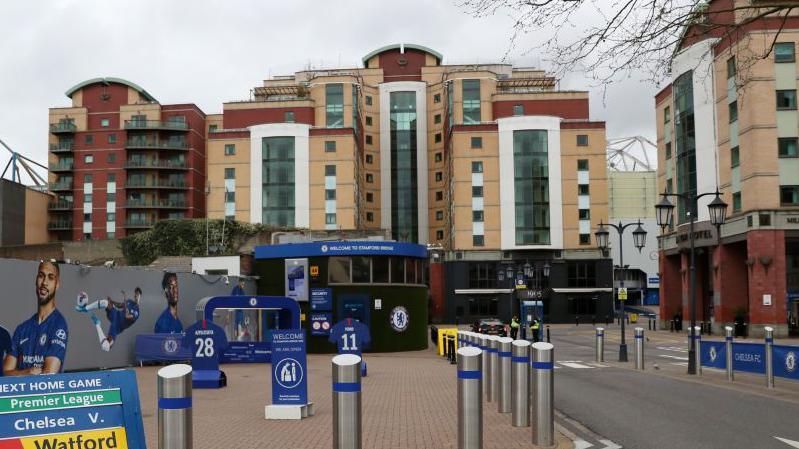Premier League clubs to be banned from selling assets to themselves

Chelsea sold two hotels next to Stamford Bridge to a sister company for £76.5m in April 2024
- Published
Premier League clubs will no longer be able to sell assets like hotels and women's teams to themselves to circumvent financial rules after they agreed to new regulations from next season.
It comes after clubs narrowly voted through a new system of Financial Fair Play (FFP) based on squad costs on Friday.
The clubs met in London to vote on three possible methods of replacing Profit and Sustainability Rules (PSR).
Squad Cost Ratio (SCR) got 14 votes in favour and six against, which is the minimum number that is required to exact a rule change.
Overall squad costs from the 2026-27 campaign will have to be limited to 85% of a club's revenue, although teams competing in Europe will have to adhere to Uefa's maximum of 70%.
Squad costs comprise player and manager wages, transfer fees and agents' fees.
Most notably it will end the loophole of selling capital assets, like hotels and women's teams.
Last year Chelsea sold two hotels to a sister company to keep them compliant with PSR.
In July, Everton sold their women's team to the parent company, while reports claim Aston Villa have agreed to do the same.
The assessment will only be based on a club's total earnings from football operations.
Rules around sustainability, which set out a club's financial spending plans over the medium and long term, were passed unanimously.
But anchoring, which would have placed a top limit on spending based on the money earned by the bottom club, failed to get the necessary support. Twelve voted against it, with seven in favour and one abstaining.
"The new SCR rules are intended to promote opportunity for all clubs to aspire to greater success and bring the league's financial system close to Uefa's existing SCR rules," a Premier League statement read.
"The other key features of the league's new system include transparent in-season monitoring and sanctions, protection against sporting underperformance, an ability to spend ahead of revenues, strengthened ability to invest off the pitch, and a reduction in complexity by focusing on football costs."
What is Squad Cost Ratio and how will it affect clubs?
PSR was about a club's balance sheet of all revenues over a three-year period, while SCR is just about team costs on a seasonal basis.
The new rules will operate a dual system, with clubs in European competition having to adhere to Uefa's SCR limit of 70% - so a club could be sanctioned by Uefa but be compliant in the Premier League.
The higher limit is intended to protect the Premier League's competitive balance, given the increased income that will be received by those clubs competing in Europe.
Chelsea and Aston Villa were both given heavy fines by Uefa for breaches in the 2024-25 campaign, and that is when the limit in Europe was 80%.
The Premier League has added some wriggle room, too, with a multi-year rolling allowance of 30% that permits clubs to spend beyond the limit. It allows clubs to invest ahead of revenue and variance or sporting underperformance.
An assessment is made each March, and the allowance is crucial to determine possible sporting sanctions applied in the same season.
The 85% marker is known as the Green Threshold. Spend above that and you get a financial penalty, although this will be far less punitive than Uefa.
The Red Threshold is 85% plus the allowance. Go beyond that, and it is a fixed six-point deduction which increases by one point for every £6.5m spent over the Red Threshold.
Think of it this way - every club will start next season on 85% + 30% allowance, so effectively 115%.
Any clubs that spend above 85% will face a fine, but they would need to be in excess of 115% to lose points.
But those percentages will change for 2027-28.
If a club spends 105% on their squad next season, it means they have used 20% of their allowance, and for 2027-28 their maximum spend before potential sporting sanction is 95%.
If a club spend less that 85%, they can increase the allowance again to the maximum of 30%.
Which clubs will be affected?
Several clubs, in healthy financial positions, were happy with PSR and wanted to keep the status quo.
SCR will not worry the biggest clubs with the best commercial operations.
But linking the wage bill to income is not attractive to clubs with less financial resources.
That is why Bournemouth, Brentford, Brighton, Crystal Palace, Fulham and Leeds voted against.
Bournemouth's ground holds just over 11,000 but they need to pay Premier League wages so could be one of the losers, and it is a similar situation for Fulham.
Savvy transfer business will be crucial for these clubs, as Bournemouth would be in no trouble this season because of their transfer business last summer.
But 85%, with the additional 30% buffer, gives every club some headroom, and time to adapt.
Aston Villa and Newcastle were among the clubs annoyed with the restrictions PSR imposed on their ability to spend on the squad. But they cannot get too excited about the move to SCR, as they have to operate to 70% as a club in Uefa competition.
Why was anchoring voted down?
With only seven votes in favour it was not close to being a viable option - but the top clubs were split over it.
Manchester City and Manchester United feared they could eventually breach the anchoring limit as their revenues grow, but Arsenal and Liverpool voted in favour of it.
Top-to-bottom anchoring (TBA) limits the total spending to five times the TV payments received from the Premier League by its bottom club.
This season it is expected that the team that finishes 20th will earn about £120m, which would create an upper anchoring limit of £600m.
But once the SCR rules are applied no club's spending limit would reach £600m.
It was intended to stop the spending of the top clubs increasingly outstripping everyone else as their revenues grow.
But some feared the cap could eventually impact their ability to compete for players with the likes of Real Madrid.
The Professional Footballers' Association (PFA), meanwhile, had previously warned that clubs would spend less on player salaries, effectively creating a wage cap which could face legal action.
There were also fears that a reduction in future broadcasting deals would effectively result in a lower cap.
Why were sustainability rules passed so easily?
This was a simple one for the Premier League clubs, because they are already going to have to produce financial projections over the short, medium and long-term.
That will be a requirement of the Independent Football Regulator (IFR), which will begin its work later this season.
Clubs will have to give projections about their financial planning and their ability to fund the running of the club.
The focus is on monitoring and the imposition of measures that return a club to compliance for any breach.
So, that would be something like a spending restriction or debt rebalancing.
Related topics
- Published17 October

